| Srl | Item |
| 1 |
ID:
130636
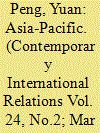

|
|
|
|
|
| Publication |
2014.
|
| Summary/Abstract |
The ability to build a new model of major-nation relations will hinge upon the long-term
peaceful cooperation between China and the United States. The author proposes a
roadmap to solve five problematic issues. All of these are essential for China and the U.S.
to co-exist peacefully and cooperate well in the Asia-Pacific region.
|
|
|
|
|
|
|
|
|
|
|
|
|
|
|
|
| 2 |
ID:
144094
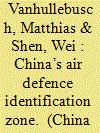

|
|
|
|
|
| Summary/Abstract |
China’s establishment of its Air Defence Identification Zone (ADIZ) is yet another manifestation on the strenuous development of regional security in East Asia. China by virtue of its so-called lawfare has instrumentalized international air law, the law of the sea, and law on the use force to reinforce its comprehensive security doctrine both on the military as well as economic front. Accordingly, China has advanced is sovereign interests through each of these branches of international law when extending its domestic laws in airspace above its Exclusive Economic Zone (EEZ), affirming its sovereignty over the disputed islands and being prepared to respond to imminent threats. Conversely, opponents of the zone have equally exploited those normative frameworks to defend their geopolitical and strategic interests in East Asia under the veil of the communitarian freedoms of overflight.
|
|
|
|
|
|
|
|
|
|
|
|
|
|
|
|
| 3 |
ID:
154567
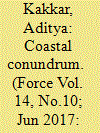

|
|
|
| 4 |
ID:
119324
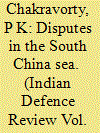

|
|
|
| 5 |
ID:
151899


|
|
|
| 6 |
ID:
126284
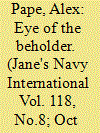

|
|
|
| 7 |
ID:
120889
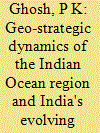

|
|
|
| 8 |
ID:
106557
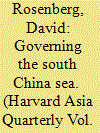

|
|
|
| 9 |
ID:
112041
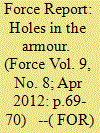

|
|
|
| 10 |
ID:
130671
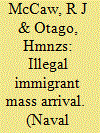

|
|
|
| 11 |
ID:
183263


|
|
|
|
|
| Summary/Abstract |
India and the United States have recently and rapidly consolidated a significant bilateral defence partnership, have a clear appetite for bilateral and quadrilateral maritime cooperation, and appear to share a common commitment to the rules and norms that govern the maritime domain. Yet the US decision to undertake and publicise a freedom-of-navigation operation targeting India in April 2021 again highlighted the two countries’ divergent interpretations of the United Nations Convention on the Law of the Sea (UNCLOS) and of customary international law. This divergence has its origins in differences in Washington’s and New Delhi’s historical engagement with UNCLOS and their preferred means of achieving security and status in the Indo-Pacific. Such differences currently preclude a deep bilateral consensus on maritime order and a common multilateral position within the Quadrilateral Security Dialogue.
|
|
|
|
|
|
|
|
|
|
|
|
|
|
|
|
| 12 |
ID:
098458
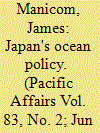

|
|
|
|
|
| Publication |
2010.
|
| Summary/Abstract |
In 2005-2006 Japan began asserting the jurisdictional rights to its maritime domain with greater authority than ever before. Tokyo prepared to conduct exploratory drilling in the disputed East China Sea and passed new laws to permit the full realization of Japan's maritime rights and responsibilities. This activist turn appears to be at odds with most explanations of Japanese strategic policy. Given its preference for strategic evolution, Japan's sudden preoccupation with the security and administration of its extended maritime zones-the Exclusive Economic Zone (EEZ) and its extended continental shelf-following years of neglect is striking. Moreover, this shift has not received a great deal of attention in the literature. This paper argues that Japan's hesitant, ad hoc and incomplete response to its changing maritime environment can be understood through Kent Calder's "reactive state" paradigm. While academic discussion of Japanese foreign policy has moved beyond the reactive state debate, Japan's approach to its ocean policy appears to fulfill both of Kent Calder's reactive state criteria. This paper analyses Japan's resistance to the expansion of state sovereignty seaward and explores how this policy inertia was exposed by China's more active maritime policy. This more assertive Chinese posture triggered the proactive turn in Japan's ocean policy, which may have negative consequences for regional security.
|
|
|
|
|
|
|
|
|
|
|
|
|
|
|
|
| 13 |
ID:
131140
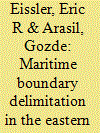

|
|
|
|
|
| Publication |
2014.
|
| Summary/Abstract |
Since 2002, the Republic of Cyprus, the Turkish Republic of Northern Cyprus, Turkey and Greece have been embroiled in disputes over the delimitation of maritime boundaries in the Eastern Mediterranean. Geopolitically and geostrategically important, the area's rich oil and natural-gas reserves have made Exclusive Economic Zones all the more relevant. Eric R Eissler and Gözde Arasýl analyse the latest developments, military postures, and the political and legal positions of the parties involved, concluding that, even though a military clash remains a remote possibility, the stalemate is likely to persist.
|
|
|
|
|
|
|
|
|
|
|
|
|
|
|
|
| 14 |
ID:
118192
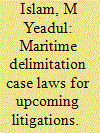

|
|
|
| 15 |
ID:
160671


|
|
|
|
|
| Summary/Abstract |
The overlapping territorial and maritime claims in the South China Sea threaten to spark conflict in East Asia. On several occasions in recent years, disputes over the right to extract oil and gas have caused clashes between Chinese and Southeast Asian vessels. The United Nations Convention on the Law of the Sea (UNCLOS) was agreed by almost all countries in 1982 to try to resolve such disagreements. However, the People's Republic of China is currently trying to claim rights that go beyond UNCLOS and infringe on the UNCLOS-based rights of the other claimants. It deploys two arguments in particular: that the archipelagos in the South China Sea collectively generate rights to maritime resources and that China enjoys ‘historic rights’ in the sea. Neither of these arguments is found within UNCLOS, however. This article explores the origin of these Chinese arguments and finds that the ‘historic rights’ claim can be traced to a single Taiwanese academic writing in the 1990s during a period of intense debate in Taiwan over its relationship with the PRC.
|
|
|
|
|
|
|
|
|
|
|
|
|
|
|
|
| 16 |
ID:
123482
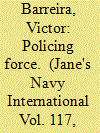

|
|
|
| 17 |
ID:
152073
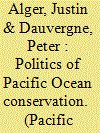

|
|
|
|
|
| Summary/Abstract |
Drawing on seventy-four interviews, this article analyzes the rising importance since the mid-2000s of large marine protected areas (MPAs) as a policy for managing ocean conservation. Governments have initiated eighteen large MPAs (over 200,000 km2) since 2006, reflecting the emergence of a new large MPA norm in marine conservation. This norm, we argue, emerged because of the success of a few transnational nongovernmental organizations (NGOs) in identifying politically feasible large MPAs, and then forming ad hoc domestic coalitions to lobby for them. This explanation is in contrast to most of the literature on how and why norms diffuse internationally, as well as existing explanations for the rise of large MPAs, both of which emphasize the importance of cohesive coalitions of transnational NGOs lobbying in multilateral venues. This bottom-up, international norm diffusion strategy has made large MPAs a viable policy option, one national jurisdiction at a time. For instance, this strategy was a critical element in convincing the UK to create the Pitcairn Islands Marine Reserve (835,000 km2) in 2015. Given the politics underlying the formation of large MPAs, where political gains have been high, and corporate and societal resistance relatively low, the creation of more large MPAs would seem likely, as occurred in 2016 when the UK announced it would designate three more large MPAs by 2020, totalling over 1.4 million km2. Growing support for large MPAs as a conservation strategy could also embolden states to establish large MPAs in more politically and economically contested waters, including on the Pacific high seas.
|
|
|
|
|
|
|
|
|
|
|
|
|
|
|
|
| 18 |
ID:
128822


|
|
|
| 19 |
ID:
122802


|
|
|
|
|
| Publication |
2012.
|
| Summary/Abstract |
In April 2012 the Commission on the Limits of the Continental Shelf (CLCS) adopted certain decisions and recommendations regarding Japan's 2008 outer continental shelf submission. The Japanese and Chinese differing interpretations of these recommendations demonstrate the still controversial legal status of Oki-no-Tori Shima under Article 121(3) of the United Nations Convention on the Law of the Sea (UNCLOS). Such a contradiction enlarges another dispute on the legal status of the surrounding maritime zone proclaimed by Japan as its Exclusive Economic Zone (EEZ). This article examines the decisions and recommendations of the CLCS as well as Japan's Submission so as to clarify the confusing situation. The decisions by the CLCS have wider implications on the unsettled scope of disputes under Rule 46 of and Annex I to the Rules of Procedure (ROP) of the CLCS, affecting submissions by other States. These implications will be explored by this article. Finally, the author offers his views on the future of such confrontational situations.
|
|
|
|
|
|
|
|
|
|
|
|
|
|
|
|
| 20 |
ID:
167515
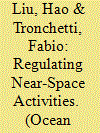

|
|
|
|
|
| Summary/Abstract |
The deployment of high-altitude vehicles in near space with the purpose of providing Internet, communication, and other services represents the new frontier of aerospace activities. Near-space operations are attracting growing interest due to their mult-purpose nature and their anticipated high profitability. Despite such positive perceptions, near-space plans are, however, hampered by the uncertain international legal status of near space. Using the precedent of the exclusive economic zone (EEZ), this article suggests a new categorization of the near space as the exclusive utilization space (EUS) and a set of rules to manage its utilization.
|
|
|
|
|
|
|
|
|
|
|
|
|
|
|
|